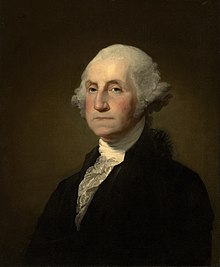President of the United States/George Washington
| Please share your thoughts about whether to merge this page with The US Presidents/George Washington. |

George Washington is the first president of the United States of America. Born in Westmoreland, Virginia, Washington became elected as president of the United States. Washington was born in Westmoreland, Virginia on February 22, 1732 in British America.
From 1754-1758, George served in the army and was in the French and Indian War, Battles around Mount Vernon (1759-1774) and most importantly, the Revolutionary War. Washington was most admired in the Revolutionary War, too. Washington was appointed the Commander in Chief on June 14, 1775. Washington was included in many battles in the Revolutionary War, such as the Battle of Boston, Long Island, Trenton and more!
After the Victory at Yorktown, the US Constitution was built in 1784. During this, the people elected Washington as 1st president of the United States in 1789, Washington continued his presidency from 1789 until 1797. The people begged for him to stay as their president, but Washington ignored them and resigned from office, permitting president John Adams to become president.
Washington died on December 14, 1799 at the age of 67, Washington was diagnosed with "cynanche trachealis", a term of that period for describing severe inflammation of the structures of the upper airway. Many people mourned his death: a loss of an American hero.
George Washington's character
[edit | edit source]George Washington had a unique persona. He was well aware of the massive fame and admiration he recieved from almost everyone around and this contributed to the way he interacted with people. He seemed to be of a "realm of his own", which some may interpret as an arrogant persona. He wasn't able to hold intellectual discussions, but tend to his farm in an excellent matter. As mentioned previously, he wasn't extroadinary in his militaristic pursuits. He didn't have great records or genuis tactics - it was his ability to keep persistant during troubled times. This rock-solid character is what won admiration from many historians who have pondered on Washington's pursuits as a commander. He was a nobody compared to the British' great collection of experienced generals, but he defied the odds and proved himself to be on top from his own hard work.
Much of his writing didn't deal with science, God, or politics, but mannerism among the common folk. This was Washington's virtue. He lacked, just like Franklin, formal education - to which he respected and showed humbleness towards. He is most known for his resignation of commander-in-chief and 1783 retirement from the public life, something the prideful world has never seen. Much to the contrary of people of power (usually), he declined becoming a "king" or "dictator" of America. Although he did became the president in 1787 after a Convention appointed him as so, to which he was excited to employ his skills on the federal government. He knew that he needed to set a good example for the executive figure and that's what he accomplished. His persistancy in retiring rather than living out his presidency set a moral tone for the government and purified the Republican character of the Constitution.
Once he finished his business, he left in 1796. Washington's obsession with his "moral hero" reputation may be seen as embarrasing (and criticized by historians), but he was able to leave this world with a remarkable impact internationally. He was said to not dwell in handshakes became it was the "norm" for presidents and bowed instead. His last few years on Earth were not pleasant ones as he saw his country fall into partisan politics, which compelled him to return in 1798 and was appointed commander of all militaries - but this didn't turn out well as he argued over the "French invasion" into politics and slowly crept himself back to his farm in Mt. Vernon, finally leaving politics for good.
